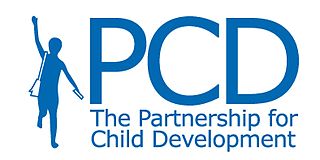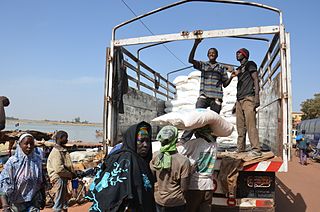Related Research Articles

Sub-Saharan Africa, Subsahara, or Non-Mediterranean Africa is the area and regions of the continent of Africa that lie south of the Sahara. These include Central Africa, East Africa, Southern Africa, and West Africa. Geopolitically, in addition to the African countries and territories that are situated fully in that specified region, the term may also include polities that only have part of their territory located in that region, per the definition of the United Nations (UN). This is considered a non-standardized geographical region with the number of countries included varying from 46 to 48 depending on the organization describing the region. The African Union (AU) uses a different regional breakdown, recognizing all 55 member states on the continent—grouping them into five distinct and standard regions.

In the United Nations, the Millennium Development Goals (MDGs) were eight international development goals for the year 2015 created following the Millennium Summit, following the adoption of the United Nations Millennium Declaration. These were based on the OECD DAC International Development Goals agreed by Development Ministers in the "Shaping the 21st Century Strategy". The Sustainable Development Goals (SDGs) succeeded the MDGs in 2016.

The United States President's Emergency Plan For AIDS Relief (PEPFAR) is a United States governmental initiative to address the global HIV/AIDS epidemic and help save the lives of those suffering from the disease. Launched by U.S. President George W. Bush in 2003, as of May 2020, PEPFAR has provided about $90 billion in cumulative funding for HIV/AIDS treatment, prevention, and research since its inception, making it the largest global health program focused on a single disease in history until the COVID-19 pandemic. PEPFAR is implemented by a combination of U.S. government agencies in over 50 countries and overseen by the Global AIDS Coordinator at the United States Department of State. As of 2023, PEPFAR has saved over 25 million lives, primarily in sub-Saharan Africa.

The population of Africa has grown rapidly over the past century and consequently shows a large youth bulge, further reinforced by a low life expectancy of below 50 years in some African countries. Total population as of 2024 is about 1.5 billion, with a growth rate of about 100 million every three years. The total fertility rate for Africa is 4.7 as of 2018, the highest in the world according to the World Bank. The most populous African country is Nigeria with over 206 million inhabitants as of 2020 and a growth rate of 2.6% p.a.

The Partnership for Child Development (PCD) is a research and technical assistance group based at Imperial College London that seeks to improve health and nutrition in school-age children and youth in low-income countries, thereby improving their education outcomes. PCD was formed in 1992 at the University of Oxford to bridge gaps between academia, funding bodies and the education and health sectors in low-income countries.

Mali, one of the world's poorest nations, is greatly affected by poverty, malnutrition, epidemics, and inadequate hygiene and sanitation. Mali's health and development indicators rank among the worst in the world, with little improvement over the last 20 years. Progress is impeded by Mali's poverty and by a lack of physicians. The 2012 conflict in northern Mali exacerbated difficulties in delivering health services to refugees living in the north. With a landlocked, agricultural-based economy, Mali is highly vulnerable to climate change. A catastrophic harvest in 2023 together with escalations in armed conflict have exacerbated food insecurity in Northern and Central Mali.

As literacy and socioeconomic status improves in Ethiopia, the demand for quality service is also increasing. Besides, changes in the demographic trends, epidemiology and mushrooming urbanization require more comprehensive services covering a wide range and quality of curative, promotive and preventive services.
The number of adults and children living with HIV/AIDS in Benin in 2003 was estimated by the Joint United Nations Programme for HIV/AIDS (UNAIDS) to range between 38,000 and 120,000, with nearly equal numbers of males and females. A recent study conducted by the National AIDS Control Program estimated the number of people living with HIV/AIDS to be 71,950. In 2003, an estimated 6,140 adults and children died of AIDS. Benin has a well-functioning system of antenatal HIV surveillance; in 2002, the median HIV prevalence at 36 antenatal clinics was 1.9%. Another study in 2002 showed an overall prevalence of 2.3% among adults in Cotonou, Benin's largest city.

Healthcare in Senegal is a center topic of discourse in understanding the well-being and vitality of the Senegalese people. As of 2008, there was a need to improve Senegal's infrastructure to promote a healthy, decent living environment for the Senegalese.
The Global Initiative for Emergency and Essential Surgical Care was established by the World Health Organization in December 2005. Its general purpose is to reduce "death and disability from road traffic accidents, trauma, burns, falls, pregnancy related complications, domestic violence, disasters and other emergency surgical conditions" by improving collaborations between relevant organizations, institutions, and agencies. Specific objectives include improving basic medical supplies at district hospitals, as well as better training for staff to bolster medical standards and care. Since its inception, GIEESC has grown to include over 2300 members from 140 countries which collaborates to share knowledge, advise policy formation and develop educational resources to reduce the burden of death and disability from conditions that could be treated through surgery.
Social franchising is the application of commercial franchising concepts to achieve socially beneficial ends, rather than profit.

A landlocked sub-Saharan country, Burkina Faso is among the poorest countries in the world—44 percent of its population lives below the international poverty line of US$1.90 per day —and it ranks 185th out of 188 countries on UNDP's 2016 Human Development Index .Rapid population growth, gender inequality, and low levels of educational attainment contribute to food insecurity and poverty in Burkina Faso. The total population is just over 20 million with the estimated population growth rate is 3.1 percent per year and seven out of 10 Burkinabe are younger than 30. Total health care expenditures were an estimated 5% of GDP. Total expenditure on health per capita is 82 in 2014.

Dr. Michel Sidibé is the African Union Special Envoy for the African Medicines Agency (AMA). He was the Minister of Health and Social Affairs of Mali. Sidibé was the second Executive Director of UNAIDS, serving from January 2009 until May 2019. He held the rank of Under-Secretary-General.
Association Pesinet is a French NGO, founded in late 2007, that leverages ICT and mobile agents to improve detection and early treatment of childhood diseases in Mali. The service combines frequent monitoring of simple health indicators with an affordable insurance system and education on preventive health practices.
After its independence from Portugal in 1975, the Mozambique government established a primary health care system that was cited by the WHO as a model for other developing countries. Over 90% of the population had been provided with vaccination. During the period of the early 1980s, around 11% of the government budget was targeted on health care. The Mozambique civil war led to a great setback in the primary health system in Mozambique. RENAMO's attack on government infrastructures included health and education systems from 1980 to 1992.

PharmAccess Foundation is a part of the PharmAccess Group. PharmAccess is an international non-profit organization with a digital agenda dedicated to connecting more people in sub-Saharan Africa to better healthcare. By making use of public-private partnerships, they leverage donor contributions, which they believe will pave the way for private investments thereby contributing to healthier populations and social and economic development. Currently, PharmAccess employs a multidisciplinary team of professionals in Tanzania, Kenya, Nigeria, Ghana and the Netherlands.

Cases of the Ebola virus disease in Nigeria were reported in 2014 as a small part of the epidemic of Ebola virus disease which originated in Guinea that represented the first outbreak of the disease in a West African country. Previous outbreaks had been confined to countries in Central Africa.
Child Mortality in Ghana describes the child mortality in the country of Ghana. Like in other parts of the world, child mortality is declining in Ghana.

Fondation Botnar is a philanthropic foundation based in Basel, Switzerland. The foundation was founded in 2003 by Marcela Botnar, wife of businessman and philanthropist Octav Botnar. It is one of the largest foundations in Switzerland, holding CHF 3.8 billion in assets. Fondation Botnar champions the use of AI and digital technologies to improve the health and wellbeing of children and young people in growing urban environments. The foundation provides a range of funding opportunities to enable research and innovative projects that fit within its strategic focus.

Corruption is endemic in Sierra Leone. Sierra Leone is widely considered to be one of the most politically and economically corrupt nations in the world and international rankings reflect this. Transparency International's 2023 Corruption Perceptions Index scored Sierra Leone at 35 on a scale from 0 to 100. When ranked by score, Sierra Leone ranked 108th among the 180 countries in the Index, where the country ranked first is perceived to have the most honest public sector. For comparison with worldwide scores, the best score was 90, the average score was 43, and the worst score was 11. For comparison with regional scores, the average score among sub-Saharan African countries was 33. The highest score in sub-Saharan Africa was 71 and the lowest score was 11. The 2018 Global Competitiveness Report ranked Sierra Leone 109th out of 140 countries for Incidence of Corruption, with country 140 having the highest incidence of corruption. Corruption is prevalent in many aspects of society in Sierra Leone, especially in the aftermath of the Sierra Leone Civil War. The illicit trade in conflict diamonds funded the rebel Revolutionary United Front (RUF) forces during the civil war, leading to fighting between the Sierra Leone Army and the RUF for control of the diamond mines. Widespread corruption in the health care sector has limited access to medical care, with health care workers often dependent on receiving bribes to supplement their low pay.
References
- ↑ "Bamako Initiative". Archived from the original on 2006-11-28. Retrieved 2006-12-28.
- 1 2 3 Chetley, Andrew (1990). A Healthy Business?: World Health and the Pharmaceutical Industry (1st ed.). pp. 126–132. ISBN 978-0862327354.
- ↑ Hardon A (1990). "Ten best readings in … the Bamako Initiative". Health Policy Plan. 5 (2): 186–9. doi:10.1093/heapol/5.2.186.
- ↑ "Bamako Initiative revitalizes primary health care in Benin". Archived from the original on 6 January 2007. Retrieved 2006-12-28.